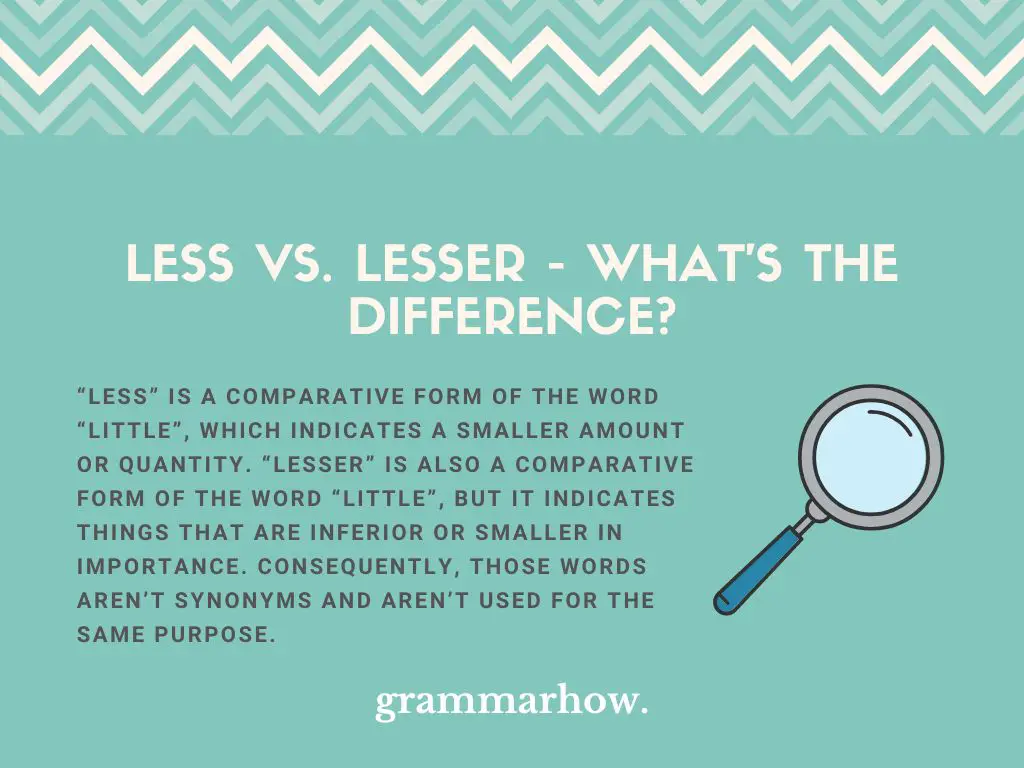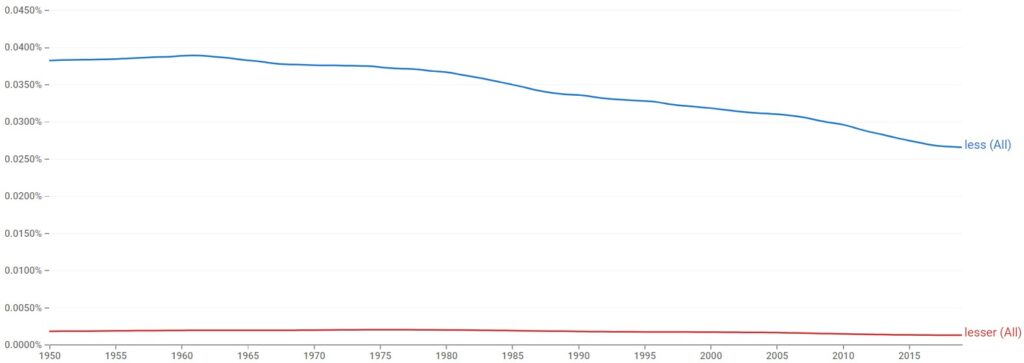Are “Less” and “Lesser” synonyms? Do they mean the same and should be used for the same purpose?
We want to know what each word means, and what are the differences between them. The goal is to be able to differentiate those words and use each appropriately.
Less vs. Lesser – What’s the Difference?
“Less” is a comparative form of the word “Little”, which indicates a smaller amount or quantity. “Lesser” is also a comparative form of the word “Little”, but it indicates things that are inferior or smaller in importance. Consequently, those words aren’t synonyms and aren’t used for the same purpose.

Take a look at the examples below:
- I think you should eat less junk food.
- I think you should eat lesser junk food. (incorrect)
- Anna said that quitting is the lesser of two evils.
- Anna said that quitting is the less of two evils. (incorrect)
Each set of examples contains a correct sentence and one that is incorrect. The first set is about eating less junk food. The correct way to talk about it is to say “eat less junk food” because the conversation is about the amount of food and not its importance.
To say “eat lesser junk food” would be incorrect, and make very little sense.
The second set is about the decision to quit something, which is talked about as “the lesser of two evils”. It means that, between two choices, the one least important or relevant would be to quit.
It’s not about quantity or amount – after all, you can only quit one, right? – but it’s about importance and value. This example uses “Lesser” correctly, while “Less” would be incorrect.
Less
“Less” is used to indicate a smaller amount of something or a smaller degree of something. “Less” is very useful in comparisons between people and things, pinpointing clearly which side has less of an item. It also provides parameters, when describing an item.
Take a look at the examples below:
- I have less hair than Tammy, so her haircut wouldn’t look good on me.
- Jada has less room in her apartment now and is selling a few things.
- You need to find a less grueling job, as soon as possible.
- Congratulations, you have less than a week to go before you graduate!
- The animal was less than two feet tall, but I didn’t see the species.
- Michael arrived less than 5 minutes after me today.
Lesser
“Lesser” is used to describe something that isn’t as great in size, amount, or importance as something else. It’s used to indicate that one thing isn’t as great as another, by being called “Lesser”.
Take a look at the examples:
- They saw Peter as less than them because of his social status.
- Zoe will be affected to a lesser extent than her sister.
- A lesser writer would not have been able to create such a captivating story.
- The company would start paying lesser wages for recruits.
- The first movie is the lesser of the two, in my opinion.
- Cory doesn’t know what he’s doing. The lesser he speaks at the meeting, the better.
Which Is Used the Most?
Although those words aren’t synonyms, we’re curious to see which is used more often to make comparisons and describe things in real life. Which one do you think is used more often, “Less” or “Lesser”?
Let’s look at the graph from Google Ngram Viewer below and find out.

“Less” is used much more often than “Lesser”. The difference is quite impressive, actually. The graph shows that “Less” has always been the preferred form and, although it seems to be trending slightly down, we think it’s unlikely it’d lose the top spot.
“Lesser” is less used, but as any correct from, you should consider it as an option to express your evaluation or description of an item.
Final Thoughts
“Less” and “Lesser” are both correct. They are comparative forms of the word “Little”, used for different purposes. “Less” should be used to indicate a smaller amount of something, when in comparison with something else. “Lesser” describes an item of less importance or value, not as great as the others.

Martin holds a Master’s degree in Finance and International Business. He has six years of experience in professional communication with clients, executives, and colleagues. Furthermore, he has teaching experience from Aarhus University. Martin has been featured as an expert in communication and teaching on Forbes and Shopify. Read more about Martin here.

